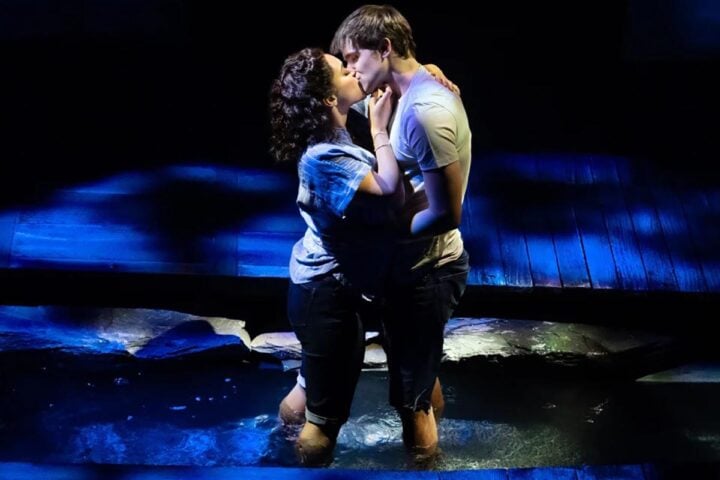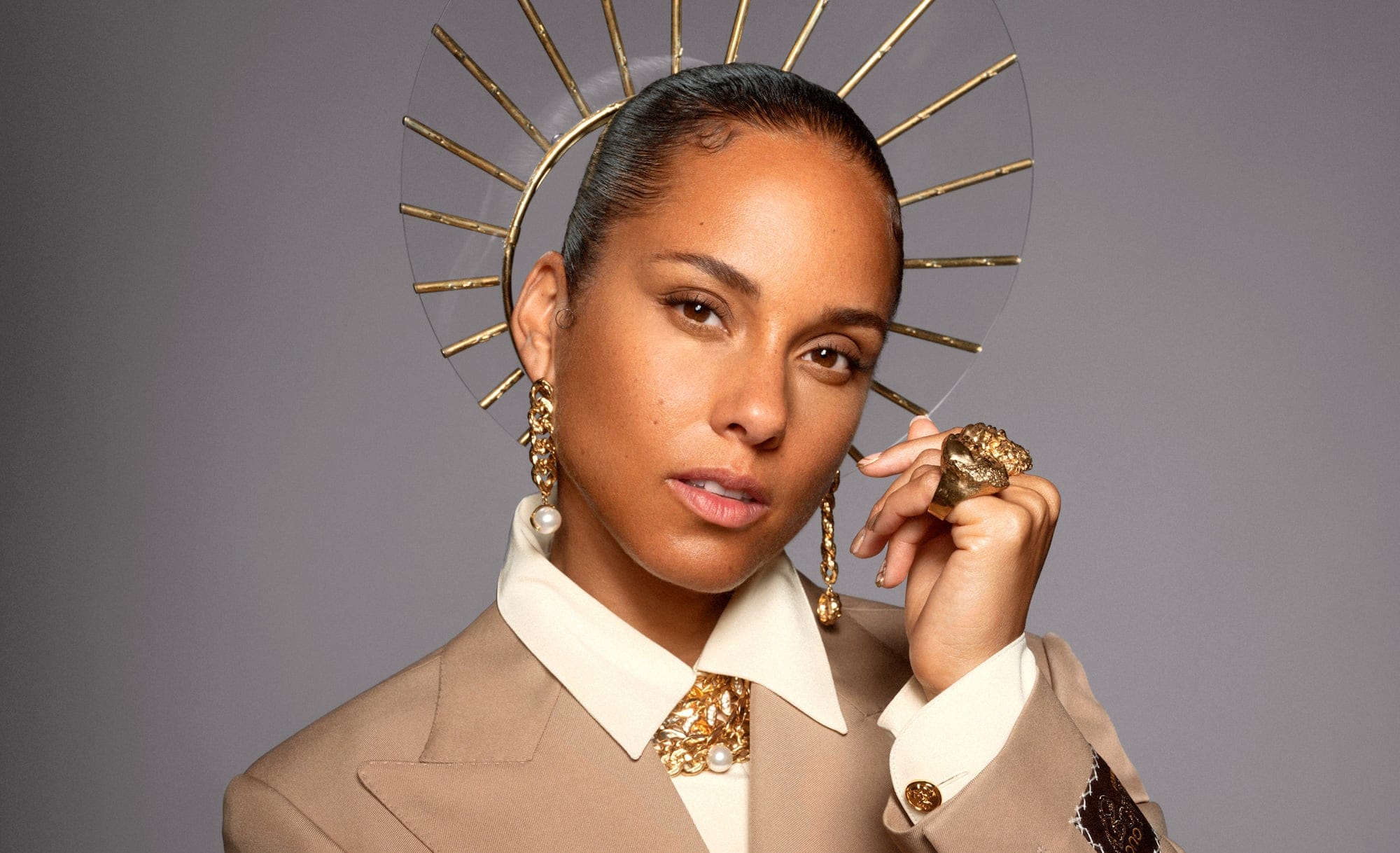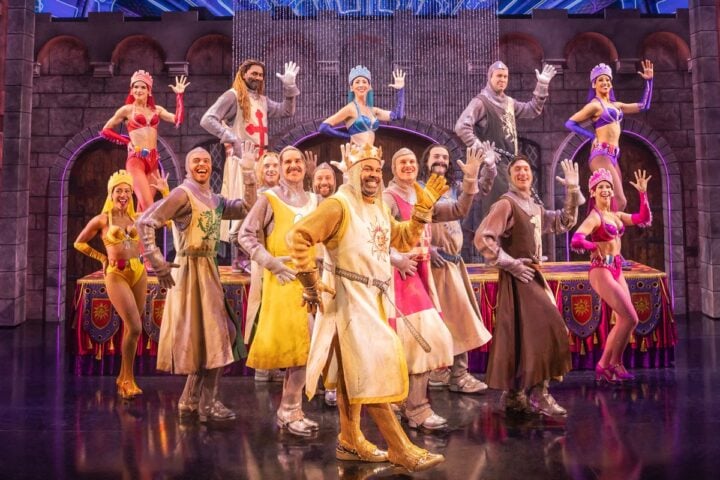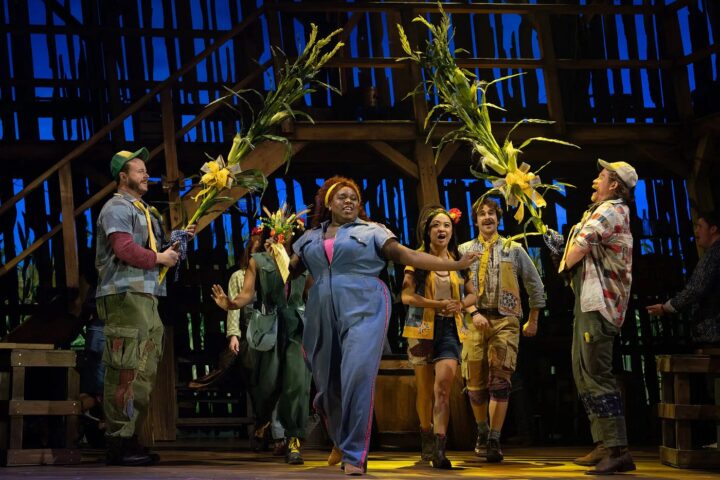In the second act of Hell’s Kitchen, Alicia Keys’s autobiographical passion project over a decade in the making, absent father Davis (Brandon Victor Dixon) sits down at a piano and asks his wary teenage daughter, Ali (Maleah Joi Moon), if she remembers the song he wrote for her that they always used to sing together. He starts to play, and the song is “If I Ain’t Got You,” the second single from Keys’s second studio album, The Diary of Alicia Keys.
Ali tentatively joins him, the electricity of Keys’s surging melody and yearning lyrics coursing across the stage and supercharging the father and daughter’s fractured relationship. As staged by Michael Greif, it’s a lovely picture, with Davis at the piano far back and Ali at the edge of the stage looking away from him and toward the audience. Sparks fly, briefly, but despite the impressive display of vocal and visual fireworks on display at the show’s world premiere at the Public Theater, Hell’s Kitchen is, dramatically speaking, something of a damp squib.
Isolate any 30 seconds of Hell’s Kitchen’s musical numbers and you’re probably looking at—and, more importantly, listening to—something marvelous. Choreographer Camille A. Brown keeps the ensemble engaged throughout in heart-pounding conversation with Keys’s music. If Robert Brill’s set, a real “concrete jungle where dreams are made of,” isn’t attractive in itself, it’s enlivened by Natasha Katz’s lighting and Peter Nigrini’s projections, especially in effectively channeling Ali’s elevator rides. Under the music direction of Dominic Fallacaro, the cast sounds tremendous, with sizzling vocal performances from Moon, Dixon, Shoshana Bean as Ali’s mom Jersey, Kecia Lewis as a dying piano teacher, and Jackie Leon as Ali’s supportive friend Jessica.
But musicals aren’t stacks of moments, and this particular assembly of excellent elements has been piled atop one of the wispiest, often most ludicrous, storylines seen on stage in a while. (The book is by Kristoffer Diaz, who previously adapted Disney’s Hercules for the Public Theater’s Public Works program.) Ali is a horny 17-year-old cooped up in an apartment in the Manhattan Plaza, a building on West 43rd Street offering affordable housing to artists, with her overworked single mother. She imagines herself as a ’90s Rapunzel, “locked away in this tower, cut off from this city.” For the most part, though, Jersey’s entreaties to Ali to get her homework done and come home at a reasonable hour don’t seem out of the ordinary. And the mismatch between Ali’s standard-fare teenage angst and the soaringly self-empowered maturity of much of Keys’s songs often diminishes the music, in context, to the point of frivolous melodrama.
As soon as Ali can slip past the Manhattan Plaza’s doorman, Ray (Chad Carstarphen), who’s far too involved in the family dramas passing by his desk, she’s off to seduce an older local drummer Knuck (the butter-voiced Chris Lee), while neglecting to mention to him that she’s a minor. At some point, Ali takes refuge from her mother in the building’s piano room, where she begins taking lessons from the commanding Miss Liza Jane (Lewis).
This is ostensibly the show’s turning point of, but Ali’s burgeoning love of music is completely forgotten for the next 30 minutes or so. (“Her passion for the instrument is insatiable,” Miss Liza Jane announces, but the show suggests that her main passion is really for sex with Knuck, even after he’s made it abundantly clear he’s not interested in continuing to sleep with a teenager who lied about her age.) Diaz’s book conveniently forgets other things along the way, too, including Ali’s best friends Jessica and Tiny (Vanessa Ferguson), supposedly important characters whose names aren’t even in the script for the entire second act until the finale.
Ali’s frustrations might be more sympathetic if her first-person narration ever transcended clichés. In Hell’s Kitchen’s opening number, “The Gospel,” Ali introduces the regulars in her neighborhood to us a la In the Heights, but she’s an Usnavi without a clearly unique point of view about the people she’s surrounded by and how she fits in with them.
When Keys has spoken about her childhood and early adolescence growing up in Hell’s Kitchen (she actually did live in the Manhattan Plaza), the R&B singer paints a grittier and far less comfortable picture of the neighborhood than Ali does. (Keys has said in interviews that she fashioned a homemade knife to carry around with her as a teen for protection.) What it means for Ali to grow up biracial raised by a white mother in a community of color isn’t ever really addressed head-on in Hell’s Kitchen, except in the not one but two unlikely scenes in which Bean’s Jersey suddenly goes Peak Karen and calls the cops on Knuck.
This credibility-stretching plot point seems designed exclusively to allow the first act to close with Lewis’s searing version of Keys’s “Perfect Way to Die,” a gorgeous elegy for Michael Brown and Sandra Bland from the singer-songwriter’s 2020 album Alicia. But since Hell’s Kitchen is not a show that explores race or the policing of Black bodies with intentionality, this registers as a careless way to demand an emotional response from the audience that Diaz’s writing hasn’t come close to earning. (Why a song that’s fairly explicitly about Brown and Bland specifically would be sung by a character living in the 1990s is a whole other question.)
Keys may be a good musical theater songwriter, but she doesn’t give herself much of a chance to prove it. With the exception of a few new songs (including the lovely “Follow the River”) clustered together early in the first act, the rest of the score is from Keys’s jukebox, mostly her biggest hits like “Fallin’,” “No One,” and “Empire State of Mind.”
This is hardly the worst example of how messy musicals become when songs are shoehorned in from non-theatrical catalogs, but there are few dramatic moments that justify the music that stems from them. (Splendidly explosive as Bean is when Jersey belts out “Love Looks Better on You” to Ali, I doubt that Keys meant “All I wanna do is you” maternally.) And because the songs and book seem to be at odds with each other, the suggestion that Keys aborted an attempt to write a fully fresh score herself makes this garbled end product that much more disappointing.
Still, a cast album would certainly be a treasure for the lushness of Dixon’s “Fallin’,” the pyrotechnic crackle of Bean’s “Pawn It All,” and the regal embrace of the bass notes of Lewis’s “Perfect Way to Die.” And Moon, in her professional stage debut, shows off the sort of silky assuredness and supple warmth that distinguished the young Keys.
Never in doubt, either, is Keys’s own significant artistry as a songwriter. The show will rightly send audiences rushing back to her albums. In her arrangements, which she co-created with Adam Blackstone (a major music director for artists like Nicki Minaj and Justin Timberlake), she’s been terrifically generous in divorcing her work from her own voice, inviting new interpretations through duets and ensembles that usually freshly reward her reinventive spirit.
For theater fans, the greatest pleasures of Hell’s Kitchen may come from Lewis, a veteran stage performer most beloved for originating roles in Once on This Island and The Drowsy Chaperone who finally seems to be getting her due. It’s delightful to see a superstar like Keys recognize the gifts that under-celebrated talents like Lewis can deliver to her music.
“This is the song we sing/We don’t need anything,” Jersey and Davis croon on Keys’s “Not Even the King,” and that’s probably a good watch-cry for a show that offers little for its cast to work with beyond a killer setlist. Don’t expect Hell’s Kitchen to wither at the Public Theater either, despite its structural flimsiness. Because when it comes to the all-but-guaranteed Broadway transfer, having nothing but “the song we sing” will likely be enough.
Hell’s Kitchen is now running at the Public Theater.
Since 2001, we've brought you uncompromising, candid takes on the world of film, music, television, video games, theater, and more. Independently owned and operated publications like Slant have been hit hard in recent years, but we’re committed to keeping our content free and accessible—meaning no paywalls or fees.
If you like what we do, please consider subscribing to our Patreon or making a donation.






